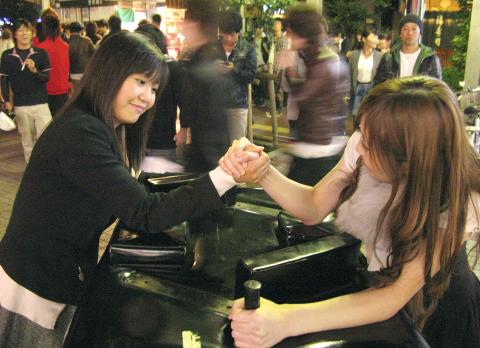By day, Kenichi Watanabe runs an insurance agency. By night, he’s an arm wrestler — and on a recent Saturday, he’s preparing to do battle.
Under a moonlit sky, Watanabe and his opponent face off across an arm wrestling table in a bustling pedestrian street in Sendai, a northern Japanese city hit hard by the March 11 earthquake. Watanabe is lean and cut, like a lightweight boxer, but his rival looks a couple of weight classes bigger.
They grip hands and adjust elbow positions. Biceps bulge, forearm veins pop. Lights from arcade and karaoke signs dance across their faces as they lock eyes and await the “Go” signal.

Photo: Reuters
“Come on, you can do it!” says a female voice among the crowd of about 30 onlookers.
Welcome to “Street Arm,” an event held in the middle of Sendai’s entertainment district, in which anyone from beginner to pro can step up and take a shot at arm wrestling.
Organized several times a year, Street Arm helps spread awareness of the sport as well as amp up weekend nightlife.
Uniting people is especially vital in Japan’s disaster-hit northeast. In Sendai, the nearest big city to the epicenter of the March quake, the downtown area survived relatively unscathed but the coastal areas suffered major tsunami damage.
“With arm wrestling, people can become closer more easily because they’re grasping hands,” the 34-year-old Watanabe said. “You can’t survive on your own, people need to stand together.”
Watanabe started arm wrestling nine years ago. Confident in his strength, he entered a local tournament — and lost. Determined to win, he launched a club that practiced weekly, and eventually won an East Japan regional tournament.
Anybody can take part in Street Arm — and many do.
Mai Takahashi and her two friends were out on the town when they came across the event.
“It looked like so much fun and I knew I’d be strong enough, so I gave it a try,” said Takahashi, 24, who works for a cellphone parts manufacturer.
She was “totally excited” after beating her friends.
Watanabe and his club mates teach techniques such as positioning the elbow for better leverage, hooking one’s thumb under the fingers for a better grip and pulling back on the opponent’s hand like a bicep curl to generate more power.
They get a diverse group involved, with participants from middle-aged men and hip-hop guys to exchange students and women decked out in party dresses after a wedding — people who in normal times probably wouldn’t be interacting with each other.
However, it’s the expert grapplers who attract the most attention, like Watanabe and the big guy from the rival club.
Force collides with force. It’s an even match early on but Watanabe gets the edge. The tension cranks, the crowd moves in.
His opponent starts coming back and gains momentum. Gritting his teeth, Watanabe summons all his strength and unleashes a final burst, sending his rival’s hand thudding to the table.
In the end, when you’re on the verge of losing and all hope seems lost, the key is to dig in mentally and stay strong, Watanabe said — a message that echoes in post-disaster Japan.

‘SHORTSIGHTED’: Using aid as leverage is punitive, would not be regarded well among Pacific Island nations and would further open the door for China, an academic said New Zealand has suspended millions of dollars in budget funding to the Cook Islands, it said yesterday, as the relationship between the two constitutionally linked countries continues to deteriorate amid the island group’s deepening ties with China. A spokesperson for New Zealand Minister of Foreign Affairs Winston Peters said in a statement that New Zealand early this month decided to suspend payment of NZ$18.2 million (US$11 million) in core sector support funding for this year and next year as it “relies on a high trust bilateral relationship.” New Zealand and Australia have become increasingly cautious about China’s growing presence in the Pacific

The team behind the long-awaited Vera Rubin Observatory in Chile yesterday published their first images, revealing breathtaking views of star-forming regions as well as distant galaxies. More than two decades in the making, the giant US-funded telescope sits perched at the summit of Cerro Pachon in central Chile, where dark skies and dry air provide ideal conditions for observing the cosmos. One of the debut images is a composite of 678 exposures taken over just seven hours, capturing the Trifid Nebula and the Lagoon Nebula — both several thousand light-years from Earth — glowing in vivid pinks against orange-red backdrops. The new image

ESPIONAGE: The British government’s decision on the proposed embassy hinges on the security of underground data cables, a former diplomat has said A US intervention over China’s proposed new embassy in London has thrown a potential resolution “up in the air,” campaigners have said, amid concerns over the site’s proximity to a sensitive hub of critical communication cables. The furor over a new “super-embassy” on the edge of London’s financial district was reignited last week when the White House said it was “deeply concerned” over potential Chinese access to “the sensitive communications of one of our closest allies.” The Dutch parliament has also raised concerns about Beijing’s ideal location of Royal Mint Court, on the edge of the City of London, which has so

Canada and the EU on Monday signed a defense and security pact as the transatlantic partners seek to better confront Russia, with worries over Washington’s reliability under US President Donald Trump. The deal was announced after a summit in Brussels between Canadian Prime Minister Mark Carney and European Commission President Ursula von der Leyen and European Council President Antonio Costa. “While NATO remains the cornerstone of our collective defense, this partnership will allow us to strengthen our preparedness ... to invest more and to invest smarter,” Costa told a news conference. “It opens new opportunities for companies on both sides of the